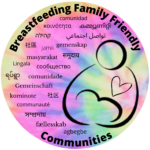Breastfeeding Family Friendly Communities (BFFC) leads coordinated policy, systems, and environmental change efforts to ensure that every family- especially those facing systemic barriers – has access to equitable infant feeding support. Through partnerships with the U.S. Breastfeeding Committee, the SAFE Infant Feeding Team, North Carolina Breastfeeding Coalition (NCBfC) and community initiatives like Breastfeed Durham, we are advancing a policy agenda that bridges gaps in health systems, strengthens public benefits access, and embeds infant and young child feeding in emergency preparedness at every level of government.
Infant & Young Child Feeding in Emergencies (IYCF-E)
The United States has no national policy ensuring infant feeding support in emergencies, leaving families vulnerable during natural disasters and crises.
Following Hurricane Helene, our SAFE (Support & Advocacy for Feeding in Emergencies) Team—a project founded by the North Carolina Breastfeeding Coalition—demonstrated what’s possible when trained infant feeding specialists partner with local shelters, health departments, and emergency management.
We are now working to embed IYCF-E into federal, state, and local preparedness frameworks, ensuring:
- Infant feeding safety is part of every emergency plan and shelter protocol.
- Counties designate clear roles for infant feeding response.
- FEMA, DHHS, and state agencies include lactation and formula safety in disaster logistics.
- Families are not left to navigate crisis conditions without safe feeding options.
The gap we’re addressing:
In the U.S., infant and young child feeding is not meaningfully built into emergency response systems. During disasters, families with newborns are often left without safe feeding supplies, lactation support, or even clean water. This is a preventable risk.
What we’re doing:
Through the North Carolina Breastfeeding Coalition’s SAFE (Support & Advocacy for Feeding in Emergencies) Team, we have shown what an emergency-ready infant feeding response looks like: trained infant feeding specialists embedded in shelters, rapid needs assessments for every parent, safe sanitation kits, breast pump access, donor human milk access, and culturally appropriate lactation support — including in rural and low-resource communities, like Western North Carolina after Hurricane Helene.
Our policy goal:
We are working to make Infant and Young Child Feeding in Emergencies a required function of government — not a volunteer patch job. That means:
- Making IYCF-E part of county emergency operations plans and continuity-of-care plans.
- Naming responsibility for infant feeding (who does what) in emergency management chains of command at county and state levels.
- Ensuring disaster shelters have safe infant feeding supplies, sanitation support, and qualified lactation support built in — not improvised after harm has already happened.
- Securing sustainable funding for emergency response so it does not collapse when volunteers run out of money.
We are already integrating emergency feeding lessons into long-term county strategic planning (see “Human Milk Feeding Strategic Plan,” below), and we are working to codify this approach statewide and nationally.
Registration Link: https://zoom.us/meeting/register/uaKgh4jqTaybkL956_6kHA
Related Work:
- SAFE Infant Feeding Team pilot in Western NC
- Integration of IYCF-E into the Ten Steps to a Breastfeeding Family Friendly Community
Strengthening Medicaid & Private Insurance Coverage for Lactation Support
The gap we’re addressing:
Right now, insurance policy — not biology — decides who gets lactation care. In North Carolina:
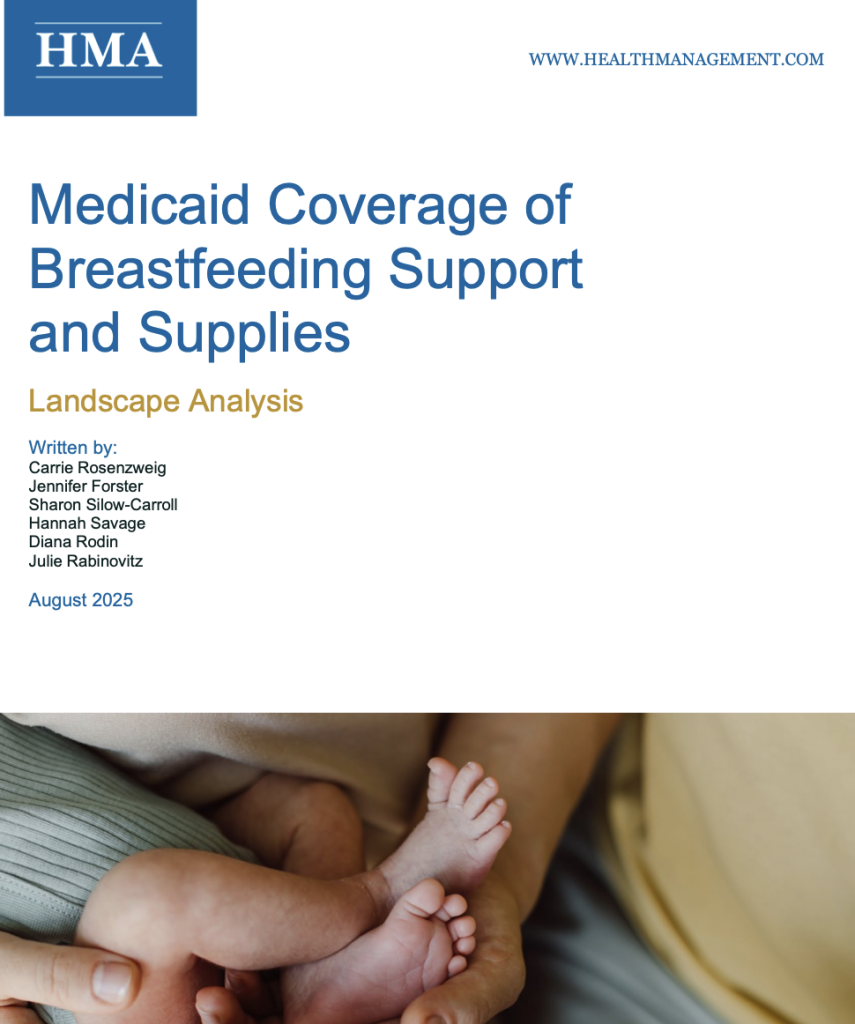
Independent IBCLCs are often not allowed to bill Medicaid or commercial insurance directly, which makes it financially difficult for community based providers to keep serving families.
Parents are being pushed into out-of-pocket/self-pay when third-party billing systems (like The Lactation Network) pull back or fail to get reimbursed by major insurers.
Pumps are treated as durable medical equipment and can require prior authorization which slows down access after birth.
Our policy goal:
We are pushing for payer reform so lactation support is treated as essential, preventive, and reimbursable:
- Direct reimbursement for IBCLCs under Medicaid and commercial plans, without forcing them to bill “under” a physician. This keeps community-rooted, culturally concordant IBCLCs in business and available to families.
- No-delay access to pumps and feeding equipment for Medicaid members (same-day access, no prior authorization hoops).
- Removal of arbitrary visit caps so families can get follow-up, not one-and-done care.
- Recognition that lactation support is cost-saving, not “nice to have.” Framing lactation as prevention — fewer pediatric hospitalizations, better recovery for birthing people, and better long-term health — is central to how we talk to Medicaid, county governments, and insurers.
We are actively in conversation with Medicaid and private insurers to build sustainable reimbursement pathways for community-based lactation care, and we are sharing those models statewide.
These reforms stabilize the lactation workforce and ensure families can access preventive care without financial hardshipItems.
Advancing Lactation-Supportive Policy for North Carolina Schools
Teachers and school staff deserve the same dignity and protection afforded by the Pump Act.
The gap we’re addressing:
Teachers and school staff across North Carolina are routinely expected to “figure it out” if they’re pumping at work — often with no protected time, risk of retaliation, or lost instructional minutes.
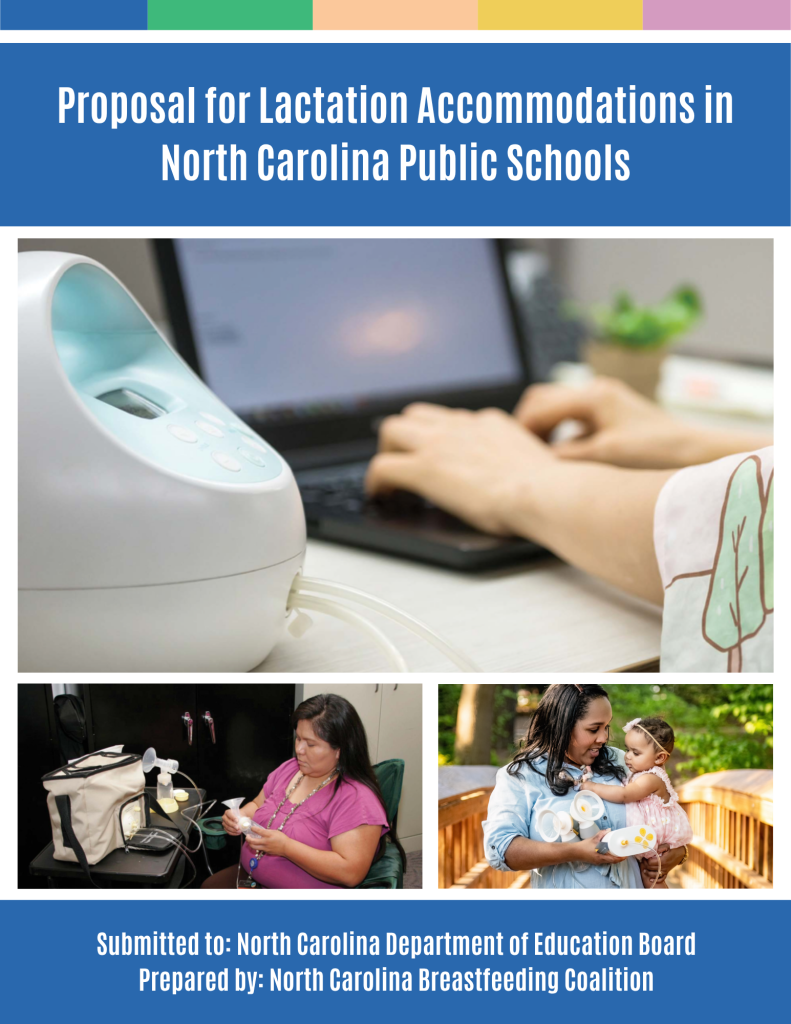
Our policy goal:
We are advancing a model school board policy for North Carolina that requires districts to:
- Normalize lactation as part of school workforce retention, not a special favor.
- Create policies that protect our school systems from liability.
- Provide protected pumping breaks.
- Guarantee a clean, private lactation space that is not a bathroom, with a chair, outlet, and cold storage.
We consider this “lactating teacher” policy a replicable unit. Any county or district can pick it up. This policy initiative aligns with the Ten Steps to a Breastfeeding Family Friendly University framework and the broader goal of making education workplaces supportive of lactation and family wellness.
Lactation Access: The Lactation Collaborative Model
The Breastfeed Durham Lactation Collaborative provides free and low-cost lactation care for uninsured and underinsured families. Our goal is to scale this model across counties—beginning with Western NC—to make equitable lactation support accessible statewide.
The gap we’re addressing:
In most places, if you’re uninsured, underinsured, recently displaced, undocumented, recently postpartum, or working hourly shifts, you’re on your own.
In Durham, we refused to accept that.
What we proved in Durham:
The Breastfeed Durham Lactation Collaborative provides free or low-cost lactation care to families who are uninsured, underinsured, or face major barriers to accessing traditional care. Care is delivered by volunteer and community-based lactation consultants, both in-home and in clinic, in English and Spanish. Families self-identify need. No paperwork wall. No proof of “deserving.”
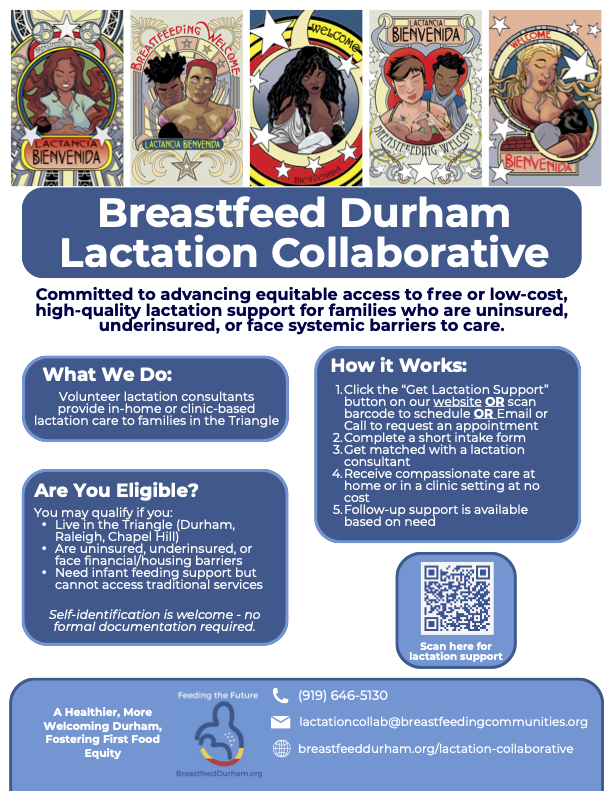
The Collaborative does more than latch checks:
- We train the next generation of IBCLCs from the communities most impacted by inequity.
- We help families navigate Medicaid-covered benefits and pump authorization.
- We connect them to WIC, SNAP, DSS, and other stabilizing supports in real time.
Our policy goal:
We are advocating that counties (or regional health entities) fund these collaboratives as core public health infrastructure. We are actively scoping replication across North Carolina, including rural and Western NC communities where IBCLC practices are collapsing. This is a policy template.
Benefits Access and Cross-System Collaboration
The gap we’re addressing:
It is not enough to tell families “breastfeeding is healthy” if the same families can’t access food, breast pumps, or covered follow-up care. Economic precarity and administrative barriers are breastfeeding barriers.
In Durham County, we co-lead a Benefits Access Subcommittee with partners from DSS, Duke Health, Lincoln Community Health Center, County Commissioners, and community organizations. The group is tasked with making sure residents — especially multilingual, immigrant, and mixed-status families — can actually get SNAP, WIC, and Medicaid without being blocked by red tape, fear, or system breakdown.
Our policy goal:
We treat benefits access as breastfeeding policy.
We are documenting this model and offering it to other counties as an approach to:
- Protect WIC and SNAP participation during federal cuts and error-rate crackdowns.
- Reduce preventable loss of Medicaid coverage during churn.
- Position lactation support as part of an economic stability strategy, not just a health education strategy.
Durham is the pilot. The goal is statewide replication.Through the Durham Benefits Access Subcommittee, BFFC is working alongside DSS, Duke Health, and community organizations to simplify access to SNAP, WIC, and Medicaid.
We focus on:
- Reducing error rates and administrative barriers.
- Integrating SNAP/WIC/Medicaid screening across healthcare and school systems.
- Ensuring language access, cultural respect, and immigrant family protections.
- Building data-sharing pilots and technology tools for automated enrollmentWorking Group Meeting Agenda.
These innovations make Durham a statewide model for equitable benefits access—one that aligns food security and family health with breastfeeding-friendly policy.
Registration Link: https://zoom.us/meeting/register/jGb-sXuIQAaopb7Ei67H8w
Donor Human Milk Access and Safe Milk Infrastructure
The gap we’re addressing:
Many medically vulnerable or displaced infants cannot safely access human milk — even when milk is available in the community — because there’s no infrastructure to move it, screen it, store it, or pay for it. This is even more urgent in crisis situations.
Our policy goal:
We are working toward a statewide expectation that:
- Counties and hospital partners maintain safe donor human milk pathways, including milk depots and distribution for medically fragile infants.
- Emergency response plans include safe milk handling and distribution, not just formula pallets.
- Community-based donor milk and milk banking is treated as essential protective care for infants, not as a luxury item.
Clinical Accountability for Evidence-Based Infant Feeding Care
Problem: Hospitals and outpatient clinics are not required to follow AAP or WHO standards for care. While North Carolina offers voluntary recognitions — the NC DHHS Breastfeeding-Friendly Maternity Care Award and the NC Breastfeeding Coalition’s Family-Friendly Clinic Award — there is no law or licensure requirement mandating compliance. Families experience inconsistent care, misinformation, and avoidable breastfeeding failure.
Policy Goal:
- Elevate these voluntary awards into statewide quality standards, linked to hospital licensure, Medicaid reimbursement, and public health reporting.
- Require that all birthing facilities and pediatric clinics meet evidence-based infant feeding standards aligned with:
- WHO/UNICEF Ten Steps to Successful Breastfeeding.
- AAP policy statements on breastfeeding and human milk feeding.
- The International Code of Marketing of Breast-Milk Substitutes.
- Mandate annual self-assessment and transparent public reporting for all hospitals and community clinics receiving state or federal funds.
- Support rural and under-resourced facilities in achieving and maintaining designation through technical assistance and shared training.
Why it matters:
Families should never have to wonder whether their hospital, clinic, or pediatrician follows the evidence. Making these standards mandatory would bring healthcare into alignment with every other public-health priority: measurable, equitable, and accountable.
The Human Milk Feeding Strategic Plan
In February 2025, the Durham County Department of Public Health formally adopted a 10-year Human Milk Feeding Strategic Plan. The plan is now driving county-level policy, workforce development, data infrastructure, and systems accountability around lactation, infant feeding, and perinatal health equity.
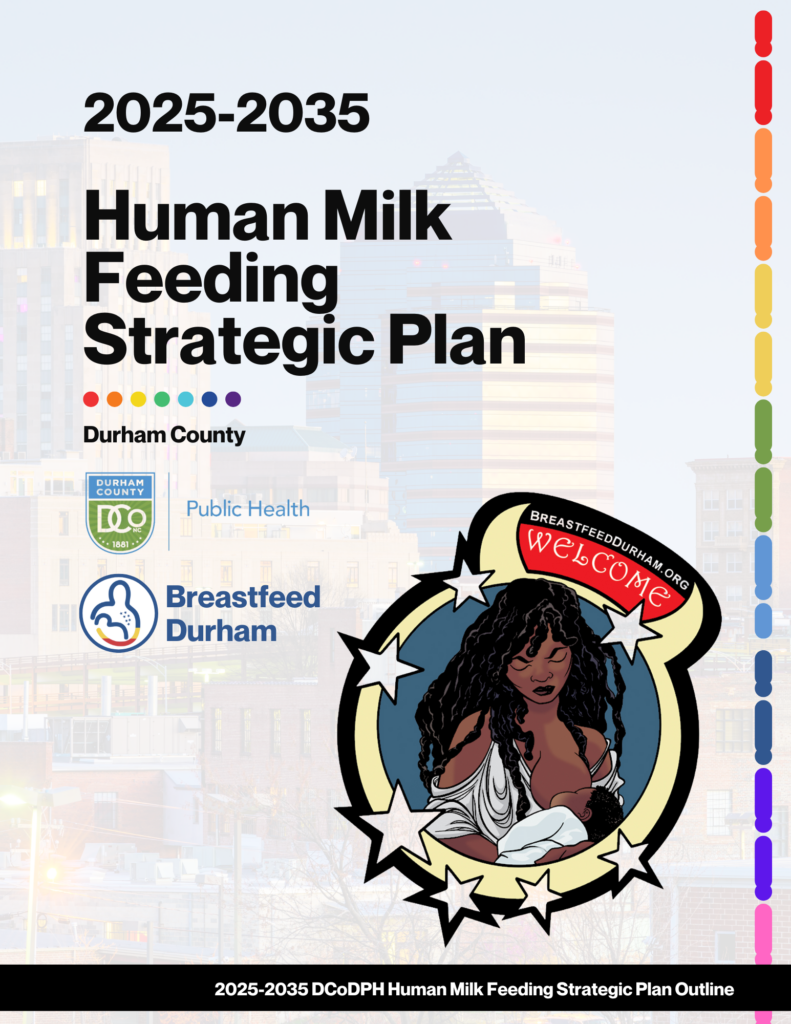
This is the first time a county health department in our network has publicly committed — in writing — to treating human milk feeding as essential public health infrastructure. It names leadership, sets expectations for culturally responsive care, establishes referral pathways, ties breastfeeding directly to racial disparities in maternal and infant mortality. It also lays out a decade-long timeline for implementation, evaluation, and accountability.
Why this matters for policy:
- It hardwires human milk feeding into maternal/infant health, chronic disease prevention, emergency preparedness, and data systems.
- It assigns roles. There’s a Perinatal Health Equity Coordinator role, shared messaging expectations for clinics, systems for warm handoffs and referrals, and a countywide push to stop formula marketing at the point of care.
- It will explicitly recognizes that human milk is a safe emergency food source when there is no water, no refrigeration, no electricity — which we saw firsthand in Western North Carolina after the hurricane — and says counties have a responsibility to plan for that.
What happens next:
We are now finalizing an Infant and Young Child Feeding in Emergencies (IYCF-E) addendum to the Plan, which will spell out how counties must protect infant feeding during disasters, including shelter operations, rapid assessment of every parent with an infant, safe donor human milk access, culturally safe lactation support on site, sanitation and pump support, and safe formula handling for families who are formula feeding.
That emergencies addendum will be released on December 1.
Our goal:
Once the IYCF-E addendum is in place, Breastfeeding Family Friendly Communities will begin promoting the Human Milk Feeding Strategic Plan + Emergencies Addendum as a replicable model, but for any health department, coalition, or statewide group that is ready to move from “programming” to policy and accountability.
Our Policy Framework
Each policy priority ties to the Ten Steps to a Breastfeeding Family Friendly Community and the Community Healthy Impact Assessment (CHIA) model.
Together, they drive our commitment to:
- Center family voice and lived experience
- Build equitable systems for care and access
- Integrate lactation into every public health and emergency framework
- Strengthen prevention and wellness through policy change
